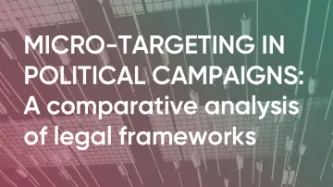Search
Content type: News & Analysis
The notorious Clearview AI first rose to prominence in January 2020, following a New York Times report. Put simply, Clearview AI is a facial recognition company that uses an “automated image scraper”, a tool that searches the web and collects any images that it detects as containing human faces. All these faces are then run through its proprietary facial recognition software, to build a gigantic biometrics database.
What this means is that without your knowledge, your face could be stored…
Content type: Explainer
Following sustained reporting by researchers, journalists and activists around the world, including recent disclosures exposed by the PegasusProject, the surveillance industry is facing scrutiny like never before.
In the latest move, eighteen U.S. lawmakers have today demanded that the U.S. government imposes sanctions on four non-US surveillance companies for, as they mention in their letter, facilitating “disappearance, torture and murder of human rights activists and journalists”.
The move…
Content type: News & Analysis
What if we told you that every photo of you, your family, and your friends posted on your social media or even your blog could be copied and saved indefinitely in a database with billions of images of other people, by a company you've never heard of? And what if we told you that this mass surveillance database was pitched to law enforcement and private companies across the world?
This is more or less the business model and aspiration of Clearview AI, a company that only received worldwide…
Content type: Video
<br />
Links
Daniel's petition: https://www.change.org/p/uk-parliament-ban-advertisers-from-targeting-eating-disorders
PI's diet ads report: https://privacyinternational.org/long-read/4603/unhealthy-diet-targeted-ads-investigation-how-diet-industry-exploits-our-data
More information on Instagram, targeted ads, and Frances Haugen - the Facebook whistleblower: https://privacyinternational.org/news-analysis/4622/reduce-facebooks-harms-teens-target-its-data-hungry-business-model…
Content type: Long Read
At Privacy International, we challenge companies and governments who infringe on our privacy and facilitate, as well, violations of other human rights.
Our most recent challenge is against Clearview AI, a company that trawls the internet to save photos of our faces to form part of their biometric database to sell. We have filed complaints alongside 3 other organisations with regulators in the UK, France, Italy, Austria and Greece. Our goal is a clear message that there is no place in society…
Content type: Long Read
In a previous article, we mapped the influence of the Chinese company Huawei across the world and how their sales of smart city infrastructures are contributing to the reshaping of our public space.
We should be alarmed by some of their product deployments – such as the installation of facial recognition technologies in countries with concerning human rights records. But also the deployments of facial recognition technology in countries without strong data protection laws are as such…
Content type: Long Read
The smart city market is booming. And with a booming market comes companies that are profiting and reshaping our public space, like the Chinese tech company Huawei.
While the term ‘Smart City’ is a broad one that encompasses many different initiatives, some with little to no impact on our privacy and other rights. Certain issues are nevertheless recurrent: the lack of transparency around public-private partnerships, the absence of consultation, and the appetite for a “tech quick fix…
Content type: Long Read
Image source
This piece is a part of a collection of research that demonstrates how data-intensive systems that are built to deliver reproductive and maternal healthcare are not adequately prioritising equality and privacy.
Telemedicine describes the vast range of applications and technologies used to provide and manage healthcare remotely.
Telemedicine as its most basic refers to the transmission of data from a patient to a healthcare professional through a range of electronic…
Content type: Long Read
Image found here.
Founded in 1959, Bounty UK Limited markets itself as an information service for pregnant women and new mothers. Prior to the pandemic, it was best known for distributing “Bounty packs” of free samples of baby products to pregnant women at midwife appointments, to new mothers on maternity wards in the UK and through its digital presence via its website and app. Bounty representatives also sold new born photography packages to new mothers at the hospital bedside. Bounty entered…
Content type: Advocacy
On 6 August 2021, the World Health Organisation (WHO) published its technical specifications and implementation guidance for “Digital Documentation of COVID-19 Certificates: Vaccination Status” (DDCC:VS) following months of consultations. As governments around the world are deploying their own Covid-19 certificates, guidance from the global health agency was expected to set a global approach, and one that prioritises public health. As such, we would expect the WHO to identify what these…
Content type: Explainer
An array of digital technologies are being deployed in the context of border enforcement. Satellite and aerial surveillance are part of the surveillance toolkit and yet, they are also used by organisations seeking to hold government actions to account and improve efficacy of their own work. To effectively critique state use and delve into potential benefits of satellite and aerial surveillance, we must first understand it.
In this explainer we dig into a technology which many are aware of for…
Content type: Advocacy
En mai 2021, nous avons fait une soumission pour la 132ème session du Comité des droits de l’homme qui a eu lieu entre le 28 juin 2021 et le 23 juillet 2021 en relation avec la conformité de la France avec le Pacte international relatif aux droits civils et politiques (PIDCP) avant l’adoption de la liste de points à traiter avant présentation de rapports (LoIPR).
Nous avons appelé le Comité des droits de l’homme de l’ONU à inclure dans la liste des questions au gouvernement français les points…
Content type: Advocacy
On May 2021, we made a submission for the 132nd Session of the Human Rights Committee that took place between 28 June 2021 and 23 July 2021 in relation to France’s compliance with the International Covenant on Civil and Political Rights (ICCPR) before the adoption of the List of issues prior to reporting (LoIPR).
We called the UN Human Rights Committee to include in the list of issues to the French government the following:
Emergency measures taken in response to the Covid-19 pandemic, and…
Content type: Long Read
The Grand Chamber of the European Court of Human Rights ruled that the UK government’s historical mass interception program violates the rights to privacy and freedom of expression. The Court held that the program “did not contain sufficient “end-to-end” safeguards to provide adequate and effective guarantees against arbitrariness and the risk of abuse.” As a result the Court ruled that UK law "did not meet the “quality of law” requirement and was therefore incapable of keeping the “…
Content type: Press release
Privacy International (PI), together with Hermes Center for Transparency and Digital Human Rights, Homo Digitalis and noyb - the European Center for Digital Rights, has today filed a series of legal complaints against Clearview AI, Inc. The facial recognition company claims to have “the largest known database of 3+ billion facial images”. The complaints were submitted to data protection regulators in France, Austria, Italy, Greece and the United Kingdom.
As our complaints detail, Clearview AI…
Content type: Video
Links:
Our report in English
Our report in Spanish
You can listen and subscribe to the podcast where ever you normally find your podcasts:
Spotify
Apple podcasts
Google podcasts
Castbox
Overcast
Pocket Casts
Peertube
Youtube
Stitcher
And more...
Content type: Examples
Article extract:
"French laws designed to prohibit individual-level targeting are circumvented by services like those provided by Paris-based firm Liegey Muller Pons, which aggregates personal data. Such services are no less data-intensive than those unconstrained by such legal requirements."
"• Liegey Muller Pons (LMP) is a digital campaigning firm that has provided services to over 1,000 campaigns across six European countries. French law prohibits individual-level targeting except under…
Content type: Examples
Article extract- translated from the original French.
"A political big data company with close ties to the federal liberals and which worked on Emmanuel Macron's campaign in France is setting up its head office in Old Montreal to continue its growth and take advantage of Montreal's digital vitality.
Data Sciences inc. (DS) was born from the victory of the Liberal Party of Canada (PLC) in the last election. Tom Pitfield, a close friend of Justin Trudeau, was leading digital operations during…
Content type: Long Read
Among the many challenges of 2020, the impact on elections around the world kept us all on the edge of our seats. 75 countries postponed national and local elections due to Covid 19. Of the elections that went ahead, we saw Covid safe measures at polling stations (South Korea led the way forward in April) an increase in postal voting (who can forget the USA, but also Poland) and political parties in Uganda conducting "virtual" campaigns as mass rallies and in person campaign meetings were…
Content type: Long Read
Political parties depend on data to drive their campaigns, from deciding where to hold rallies, which campaign messages to focus on in which area, and how to target supporters, undecided voters and non-supporters, including with ads on social media. Political parties increasingly hire private companies to do the bulk of this work, and our primary concern is how these companies use personal data to “profile” people and drive election campaigning.
As part of PI’s programme of work on Defending…
Content type: Long Read
This report is available in English.
La mayoría de los documentos nacionales de identidad y demás documentos emitidos por autoridades estatales incluyen un marcador de género. Estos marcadores suelen recibir el nombre de “marcador de sexo” aunque este término no sea preciso. La presencia de dichos marcadores, especialmente en los certificados de nacimiento, promueve el énfasis de nuestra sociedad en el género como criterio de asignación de identidades, roles y responsabilidades sociales. Al…
Content type: Long Read
Este informe está disponible en español.
Most national ID or identifying documents include a gender marker. This is often known as a 'sex marker,' even though the term is inaccurate. The presence of such markers, especially on birth certificates, contribute to our society’s emphasis on gender as a criterion for assigning identities, roles and responsibilities within society. With gender being such a determining and dominant identifier, it puts it at the centre of so many arrays of our…
Content type: Press release
Privacy International announces the launch of two reports as part of its work on Defending Democracy and Dissent.
The report Online Political Ads: A study of inequality in transparency standards builds on our 2019 research findings and delves into the adverse impacts of non-existent or limited transparency on democracy based on two case-studies developed by our partners InternetLab and ELSAM.
The report, Micro-Targeting in Political Campaigns,…
Content type: Report
This paper examines the various legal frameworks governing micro-targeting in political campaigns in six states: Canada, Brazil, France, Italy, Spain and the UK. It aims to assess national practices as well as point out gaps in their respective frameworks. The paper commences by examining how micro-targeting is defined and thereafter examines the legal provisions applicable to micro-targeting activities.
To do this in an accessible way, the paper follows and analyses the series of activities…



















